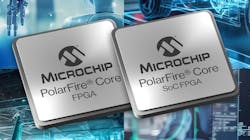Radiation-hardened FPGAs and systems-on-chip for mission-critical applications introduced by Microchip
Summary points:
- PolarFire Core FPGAs and SoCs offer as much as 30 percent cost savings by eliminating integrated transceivers while maintaining low power use and strong security.
- Devices are for defense, aerospace, industrial, and medical applications.
- Parts offer single-event upset immunity and quad-core RISC-V processing for mission-critical reliability, even in radiation-hardened applications.
CHANDLER, Ariz. – Microchip Technology Inc. in Chandler, Ariz., is introducing PolarFire Core field-programmable gate arrays (FPGAs) and systems-on-chip (SoC) for defense, aerospace, industrial automation, and medical applications.
These devices derive from the base PolarFire families and reduce customer costs by as much as 30 percent by optimizing features and removing integrated transceivers, and offer the same low-power consumption and proven security and dependability of classic PolarFire technology.
Single-event upset immunity
PolarFire Core families feature single-event upset immunity for mission-critical reliability -- even in radiation-hardened applications -- integrate a quad-core, 64-bit RISC-V microprocessor, and are pin-to-pin compatible with other PolarFire FPGAs to accommodate design stock-keeping units.
PolarFire Core FPGAs and SOC devices have support from Microchip's Libero SoC design suite, SmartHLS compiler, VectorBlox Accelerator SDK, and Microchip's Mi-V ecosystem for rapid RISC-V application development. They are compatible with PolarFire FPGA and SoC development boards.
For more information contact Microchip Technology online at www.microchipdirect.com.
